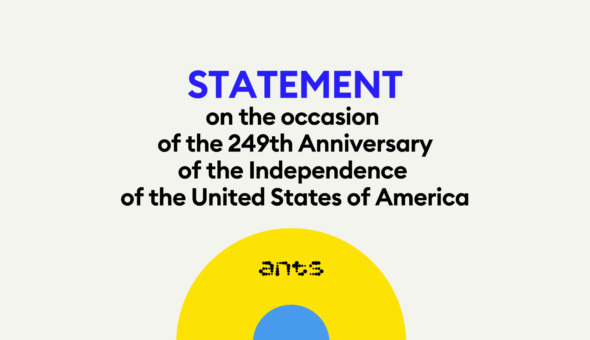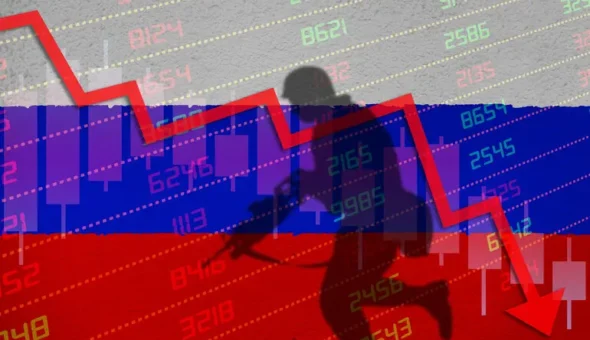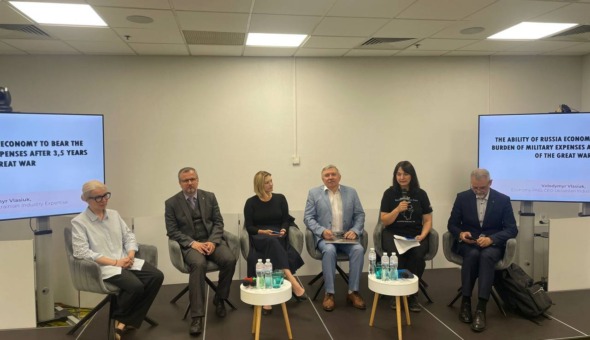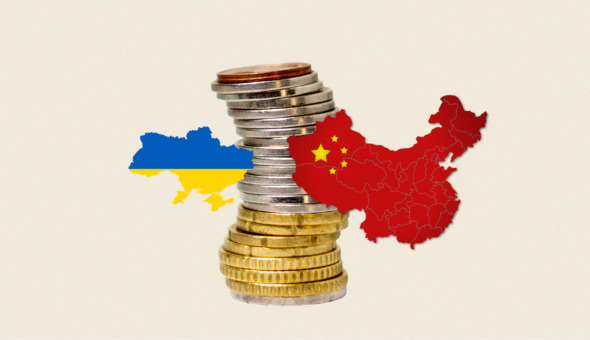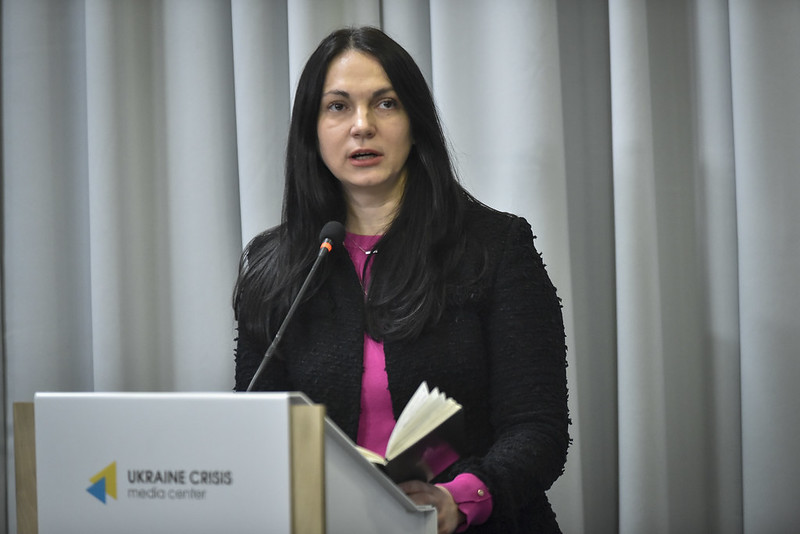
The experts at a discussion panel hosted by the National Interests Advocacy Network “ANTS” suggested these solutions to Ukraine’s path to EU membership. The European Union must strengthen its political will, and Ukraine must implement all of the recommendations of the European Commission.
On February 3, 2023, the 24th EU-Ukraine Summit will take place. As a prospective member of the EU, Ukraine will take part in it for the first time. At Ukraine House on the eve of the summit, leaders of the European community, Ukrainian government, and civil society discussed how to respond to the negativity of Eurosceptics and what ambitious goals we should establish for quick European integration advancement. The National Interests Advocacy Network “ANTS” and its collaborators from the New Europe Center started the conversation.
Denys Shmyhal, the prime minister, recently stated that Ukraine has a bold plan to join the European Union within the next two years. The same seven recommendations from the European Commission that our nation received along with its candidate status for the EU must first be evaluated in order to determine whether the “homework” has been completed.
Hanna Hopko, chairman of the Board of the National Interests Advocacy Network “ANTS” and Head of the Verkhovna Rada Committee on Foreign Affairs, emphasized that “European integration shows that we need to stop treating Ukraine as a buffer zone and consider it as a full member of the European Union and NATO” (2014-2019). The EU summit must take a stand on the urgent need to mobilize all forces, particularly military support, for Ukraine’s victory. 2023 ought to be the year of success. The protracted conflict shouldn’t last longer than ten years. Therefore, it is important for us that there be an understanding of victory despite all the topics we are discussing: economic cooperation, sanctions for Russia, asset confiscation, and tribunal. Additionally, there should be no haggling. The EU must comprehend that winning the battle against Russia and defeating Russia militarily is a shared success. Because we have triumphed in this struggle against despotism. On the road to victory, be unrelenting and make no concessions. The EU needs to take a strong leadership role in organizing all forces through multiple platforms, including the G-7 and Ramstein, to win!” – Hanna Hopko said.
Alyona Getmanchuk, Director of the New Europe Center, presented the results of the latest monitoring of Ukraine’s implementation of the EU Candidate Check-3 recommendations
“We have 5.8 points out of 10 possible. We note that there is only one position where there is a rollback. This is the Constitutional Court’s reform. The anti-oligarchic reform still has the same score. Other areas indicate development. In other words, Ukraine is moving in the right direction. Despite the fact that there is still much work to be done and a lot of undercurrents and barriers to overcome, we can see that there is a consensus on both the political and social levels, which is crucial for the overall process of EU membership,” – Alyona Getmanchuk said.
Candidate country status brings Ukraine one step closer to the European Community by recognizing it as a European state.
According to Matti Maasikas, head of the EU delegation to Ukraine, the EU has already acknowledged Ukraine as a member state of the European Union.
“We recognize that Ukraine has been heroically defending the principles, values and security of Europe, despite aggression and war. Ukraine is still strongly committed to the concept of the EU. The European Union’s decision on June 23 to grant Ukraine the status of an EU candidate country recognized that Ukraine is, in fact, a European state”.
All the participants of the event are convinced that Ukraine belongs in the European Union and that full membership is only a matter of time. The speakers’ optimism and ambition in evaluating Ukraine’s efforts, though, varied a little.
Not to miss the chance one step away from the Eurodream
“Contrary to the research that other nations have conducted, I want us to be clear that there is no exclusive, alternate, or other path to become a member of the European Union. Given the current situation in Ukraine, and that it won’t affect us,” – said Ivanna Klympush-Tsintsadze, head of the Verkhovna Rada Committee on Ukraine’s EU Integration.
She expressed the view of one of her European colleagues who claimed that if all of the recommendations of the European Commission are not implemented at 110%, no PR campaign will help Ukraine join the EU and begin membership negotiations. She also stressed the importance of being extremely responsible for their implementation.
“We just have no right to waste such an unique, historic opportunity. We have no right to ignore the leadership of the European Commission and the European Council’s even personal interest in seeing that Ukraine begins membership negotiations as soon as feasible “According to Ivanna Klympush-Tsintadze.
Ukraine joining the EU in 2025
A more optimistic person is Vadym Halaychuk, First Deputy Chairman of the Verkhovna Rada Committee on Ukraine’s Integration with the EU, who thinks that Ukraine can achieve its goals of European integration as early as 2025.
“These are not just dreams. This calculation and work have been ongoing for many years”.
He also out that Ukraine is in a crisis and needs the same courageous actions:
“As we have seen, political will can be developed and organized, so I fully agree with our government’s optimism. In addition, the Ukrainian Verkhovna Rada shares this hope. Many things have been done to expedite the procedure. Numerous laws, including updated procedures that will enable us to accomplish this more quickly and effectively, are being approved. And another notable example of this is the development in Ukraine’s execution of the seven recommendations made by the European Commission, as Mr. Ambassador mentioned”.
In 2023, negotiations to bring Ukraine into the EU should begin.
The upbeat outlook of Ukraine is shared by its European allies, albeit they are more circumspect about how long these conversations will last.
The beginning of negotiations, according to Andrius Kubilius, a member of the European Parliament and the leader of the global organization “Together for Ukraine,” is possible this year, but the negotiation process itself will take three to four years.
“Even after the quick ratification of all the legislation, this was our experience (the author clarifies: Lithuania’s experience). We think that the parliament will require all of this time to discuss everything and join the EU,” – Andrius Kubilius remarked.
He believes that there are two obstacles in the way of Ukraine joining the EU: the necessity for changes in Ukraine and the strengthening of Western political will.
Andrius Kubilius stated in his speech that “it is time for the European community and the EU to create a certain integration Ramstein, so that the political will on the Western side is strengthened and demonstrates a clear strategy and understanding of why Ukraine’s integration into the EU and NATO is not only advantageous for Ukraine, but also necessary for the European continent”.
Furthermore, Andrius Kubilius made a comparison between the negotiations between Ukraine and the EU, in which European nations at first objected to sending Leopard tanks.
“We’ve all seen some challenges faced by European nations as they transitioned from outright denials that they would provide leopards to firm commitments to do so. I wanted to know why this choice had not been made earlier. The decision to admit Ukraine to the EU may have a similar outcome,” – Andrius Kubilius underlined this.
Hanna Hopko, Chair of the Verkhovna Rada Foreign Affairs Committee (2014–2019) and Head of the National Interests Advocacy Network “ANTS” Board, highlighted that European officials’ perceptions of Ukraine should be altered:
“European integration demonstrates that we should stop thinking of Ukraine as a buffer zone and start thinking of it as a full member of the European Union and NATO”.
At the 24th EU-Ukraine summit on February 3, 2023, Presidents of the European Council Charles Michel and the European Commission Ursula von der Leyen will meet with President of Ukraine Volodymyr Zelenskyy.
Since the start of russian aggression and after the European Council gave Ukraine candidate nation status, this is the first summit between the EU and Ukraine.
Expecting that at the summit’s ending, the leaders will make a joint statement.
The 24th summit between the EU and Ukraine will be covered by the National Interests Advocacy Network “ANTS”.
The publication was made within the MATRA Program with the support of the Embassy of the Kingdom of the Netherlands in Ukraine. The opinions expressed are those of the authors and should not be taken to reflect the official position of the Embassy.
